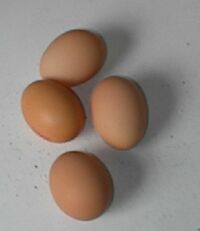
Va au travas sus un oeu! - Go to work on an egg!

l's oeufs
|
Eggs are not just for Easter, though un oeu d'Pâques (an Easter egg) is always beinv'nu (welcome). One slight oddity about eggs in Jèrriais is that one egg is un oeu, but eggs are des oeufs - spelled with a silent “f” for historical reasons. Small children, though - and their parents - would talk about un coco (an eggy-weggy) which explains why an eggcup is un cocotchi.
Comme tchi qu'ous aimez vos oeufs? (How do you like your eggs?) Bouoillis (boiled), fricachis (fried) or sus l'ticl'ye (scrambled or poached - literally “on the kettle”)?
The shell is la cruque, and to crack the egg is crutchi l'oeu - which you'll need to do if you're making eune gâche (a cake) or eune omelette (an omelette). D's oeufs d'battus are beaten eggs.
Tch'est qu'ou mangiz auve vos oeufs? (What do you eat with your eggs?) Du pain rôti (toast), des frites (chips), du lard feunmé (bacon) ou des pais (or beans)?
Eggs are so well packaged that if something is absolutely stuffed full, we say pliein comme un oeu (as full as an egg) - which is very different from saying pliein comme un ticl'ye (as full as a kettle - drunk as a lord)!
In any case, i' n'faut pon mett' touos ses oeufs dans l'même pangni (don't put all your eggs in one basket)!
Viyiz étout:

R'tou à la page d'siez-mé | Back to home page


